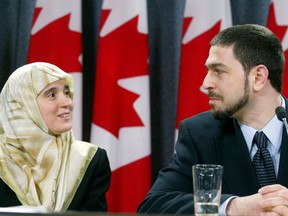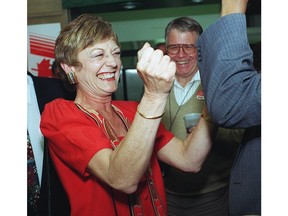Her work as a politician took her from council chambers to the House of Commons to a dark, dank Syrian prison.

Article content
When Marlene Catterall retired from Parliament in 2005, then-Ottawa Citizen columnist Kelly Egan asked her what her most memorable day as an MP had been.
Easy, Catterall said: the release of Maher Arar from the Syrian prison where he had been held for more than a year.
“When Maher Arar arrived from Montreal and …” Catterall told Egan before pausing to collect herself.
Advertisement 2
Story continues below
Article content
“Oh, God, I can hardly talk about this without crying,” she said. “He came over to me and put his arms around me and said ‘Miss Marlene.’”
Catterall, who died this week at age 85, was a trail-blazing politician who served on Ottawa city council and later as Liberal MP for the constituents of Ottawa West-Nepean for 17 years. That work took her from council chambers to the green-carpeted House of Commons to a dark, dank Syrian prison, where she was one of the few outsiders allowed to visit the imprisoned Arar.
“The most difficult experience I’ve ever had was being there in Damascus, actually being there in the same room with him, and not being able to do anything,” Catterall told Egan.
Arar, who holds dual Syrian and Canadian citizenship, was arrested in the United States in September 2002, a year after the 9/11 terror attacks, and accused of being involved with al-Qaeda. The Americans rendered him to the Jordan and he eventually ended up imprisoned in Syria, where he said he was tortured and held in solitary confinement.
In Canada, Arar’s wife, Monia Mazigh, turned for help to Catterall, her MP.
Advertisement 3
Story continues below
Article content

“I wrote to her. I spoke to her and she came to visit me several times,” Mazigh said Thursday, recalling how Catterell held the couple’s young son in her lap as they spoke.
“I was very kind of skeptical about what a politician could do or would be willing to do, but to her I was her constituent, and, no matter what she could or could not do, she showed me that she cared. That was so important.”
The support meant a lot in the years after 9/11, when Islamophobia still ran high.
“There are things I can’t really forget. There was this heavy feeling of fear. And, for me, as a visible Muslim woman, I felt I always had to prove my loyalty somehow,” Mazigh said.
“She really wanted to do something, genuinely. She saw the human aspect of the situation. She knew my mom. She knew my kids.”
Eventually, Catterall and now former Liberal MP Sarkis Assadourian travelled to Syria to visit Arar. She carried with her a letter from Mazigh to her husband and photos of the couple’s children.
“That was so important. We didn’t have any news from him, even that he was still alive,” Mazigh said. “She was my messenger. She was the link between us. I knew that he would see it as a very, very strong message that we haven’t let him down.
Advertisement 4
Story continues below
Article content
“For Maher to have his MP visit him, that was so powerful.”
Catterall later set up a meeting between Mazigh and Bill Graham, then foreign affairs minister, that Mazigh said was instrumental in finally winning her husband’s freedom. Catterall would later testify before a parliamentary inquiry into the Arar affair.
Marlene Catterall was born in Ottawa on March 1, 1939. A high school teacher, she was drawn to municipal politics because she thought councillors at the old city hall on Green Island weren’t listening to residents’ concerns.
“I thought, ‘What are these idiots doing, sitting down there on Green Island, making decisions about this community, without ever talking to the people who live here and know what it’s all about?’” she told Egan.
“Meeting with real people with real problems, it keeps my feet on the ground. It keeps my head where it needs to be.”
She ran for mayor once, in 1985, but was trounced by Jim Durrell.
In 1988, she won a seat in Parliament, where she served as Liberal MP for Ottawa West and later Ottawa West-Nepean until 2005. In 2001, she was named government whip by former Prime Minister Jean Chrétien, making her the first woman in that position.
Advertisement 5
Story continues below
Article content
Prime Minister Justin Trudeau paid tribute to Catterall on social media, writing on X that she had been a “trailblazer for women” whose “tireless work as a social activist, politician, and Canada’s first female Chief Government Whip opened countless doors for future generations.”
Mayor Mark Sutcliffe posted on X that he was saddened by her death. “Marlene served our community passionately for many years on Ottawa city council and as a Member of Parliament. She was an activist and a trailblazer, and a very kind and caring person,” he wrote.

As an MP, Catterall successfully lobbied for the installation of the popular Famous Five monument, now displayed outside the Senate of Canada building. She was also instrumental in the fight for pay equity for female public servants. That role was acknowledged in March, when she was awarded the Governor General’s Award in Commemoration of the Person Case.
“Throughout her life she pursued the goals of the Famous Five to open doors for women to participate fully In Canadian life including as decision makers in elected office,” reads her bio associated with the honour.
Advertisement 6
Story continues below
Article content
“Always attentive to the needs of the most disadvantaged, Marlene worked with local underprivileged women, setting up grocery programs, restaurant, and computer skills training for mothers and youth, sparking the dynamic of women helping women.”
But perhaps her greatest love — besides husband Ron and their children Karen, Chris and Cheryl — was for Canada itself.
In a rare opinion piece for the Citizen in 1991 — Catterall preferred to work quietly, out of the headlines — she wrote about the risk of Quebec separation.
“Ripping a huge chunk out of the heart of Canada would simply leave the country bleeding, not healed,” she wrote. “Canada would cease to exist. The remaining provinces might choose to form a new country. They might even call it Canada, but it would be a poorer and blander country.”
And, with the same concern that drew her into politics in the first place, she implored politicians to listen to the people.
“In this important debate, leaders cannot afford to mistrust the wisdom of Canadians, as they have done in the past. Members of Parliament must create opportunities to share in the efforts of their constituents to understand one another and seek common solutions.”
As Catterall told Egan in 2005: “If there’s one thing I can’t tolerate, it’s people putting down this country,” she said. “Do we not know how lucky we are?”
Article content
Comments